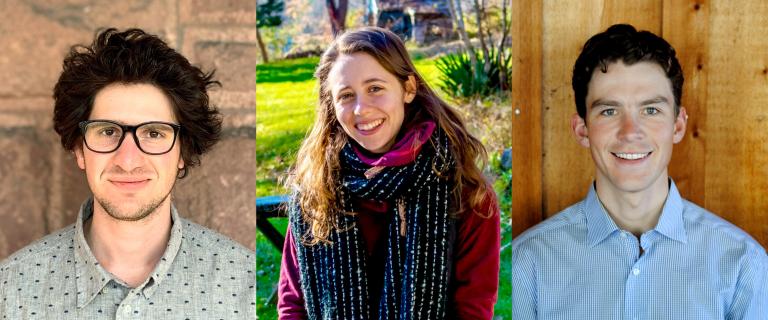
From left: Zane Weinberger, Sarah Baer, and Jake Barker

From left: Zane Weinberger, Sarah Baer, and Jake Barker
Three Yale students focusing on environmental management and climate change mitigation have been named 2023 Wyss Scholars, a program that supports a new generation of leaders in their pursuit of graduate-level education in land conservation.
Jake Barker ’24 MF, Zane Weinberger ’24 MF, and Sarah Baer ’24 JD were selected by the Wyss Foundation to receive tuition, internships, and post-graduate support.
The Wyss Foundation is a charitable organization that supports land conservation in the U.S. and internationally. Wyss Scholars learn the latest in conservation law and policy and apply that knowledge in careers at land management agencies and non-profit conservation groups such as The Nature Conservancy, U.S. Forest Service, and National Park Service.
“The challenges facing landscapes across the U.S. will require the talent and ingenuity of the next generation of leaders who can draw on the interdisciplinary training they receive at places like YSE. With the generous support of the Wyss Foundation, these three students will be well-positioned to make their individual mark on the land conservation community and advance the ambitious global goals set by the 30 x 30 initiative. I am truly grateful for the Foundation’s continued investment in our talented students,” says Dean Indy Burke.
With the generous support of the Wyss Foundation, these three students will be well-positioned to make their individual mark on the land conservation community and advance the ambitious global goals set by the 30 x 30 initiative.”
From firefighter on federal lands to forestry technician at the U.S. Department of Agriculture to law clerk at Greenpeace International and Our Children’s Trust, the students bring a range of experience and interest to their research and future career goals.
Born and raised in Steamboat, Colorado, Barker is focused on the intersection of forest restoration, climate resilience and cultural values in Western communities. His long-term goal is to work on forest conservation across the Pacific Northwest, the Northern Rockies, and the Intermountain West. He is a research assistant with YSE’s Ucross High Plains Stewardship Initiative, and collaborates with The Nature Conservancy in Wyoming to address forest restoration and health. He also is an intern at the Yale Carbon Containment Lab.
“To be a leader in environmental conservation is to serve working lands and forests, continuing the multigenerational project of taking care of our home,” Barker says. “I have participated in the important task of integrating ecological, social, and economic factors in long-term forest management.”
His interest in public and private forests across the U.S. has been influenced by his work as a forestry technician for the U.S. Department of Agriculture Forest Service Enterprise Program and for Springboard Forestry.
“As forest carbon markets continue to become more viable as a way for forest owners and managers to keep forests as forests, I believe we need to be asking many questions about ensuring quality and permanence of these programs, as well as how they intersect with other forest management approaches,” Barker says. “We also need to focus on integrating the multiple values that communities, ecosystems, and economies have for public and private forestland, including recreation, water, timber, non-timber forest products, wildlife habitat, and carbon.”
How can small-scale land conservation organizations network to leverage greater power in conserving wildland-urban interface areas?
For Zane Weinberger, that is one of the most interesting questions in forestry today — and one the Wyss scholarship program will help him continue to explore.
“In New England, where a majority of forested land is private, the web of conserved land is complex,” he says. “I hope that the support from the Wyss Scholars Program will help me to collaborate with landowners to conserve forest land for a variety of uses.”
Weinberger has worked as a firefighter for several federal agencies including the U.S. Bureau of Land Management, National Park Service, and the U.S. Forest Service. A native of Nevada City, California, he is an apprentice urban forester with YSE’s Urban Resources Initiative.
He plans to work as an apprentice forester this summer to gain experience and become better acquainted with forest issues in New England.
Baer developed a passion for the natural world while growing up in Connecticut.
“I think that more people should ask about the intersection between conservation and humanity,” she says. “I believe that at its core, conservation is about understanding the inherent value of and interconnectedness between humans, animals, and land. This understanding must underpin a durable shift toward environmental and climate justice for all people, as well as a world where animals and ecosystems can thrive. Ultimately, the physical and moral fate of humanity depends upon our sustainable stewardship of the natural world around us.”
Baer studied environmental issues within the context of preservation and social justice as an undergraduate at the University of Pennsylvania and then joined Ubuntu Pathways, a nonprofit that implemented holistic, grassroots solutions to foster community-led development. She decided that to tackle the systemic challenges facing both humanity and the planet, law school would provide the best path forward for her. Baer has served on the board of the Yale Environmental Law Association and worked as a law clerk at Greenpeace International and Our Children’s Trust.
She wants to spend her career expanding the number of stakeholders invested in long-term environmental preservation.
“Truly sustainable conservation practice must derive from a shared belief in the inherent — rather than economic — value of people, animals and the land itself,” Baer says.